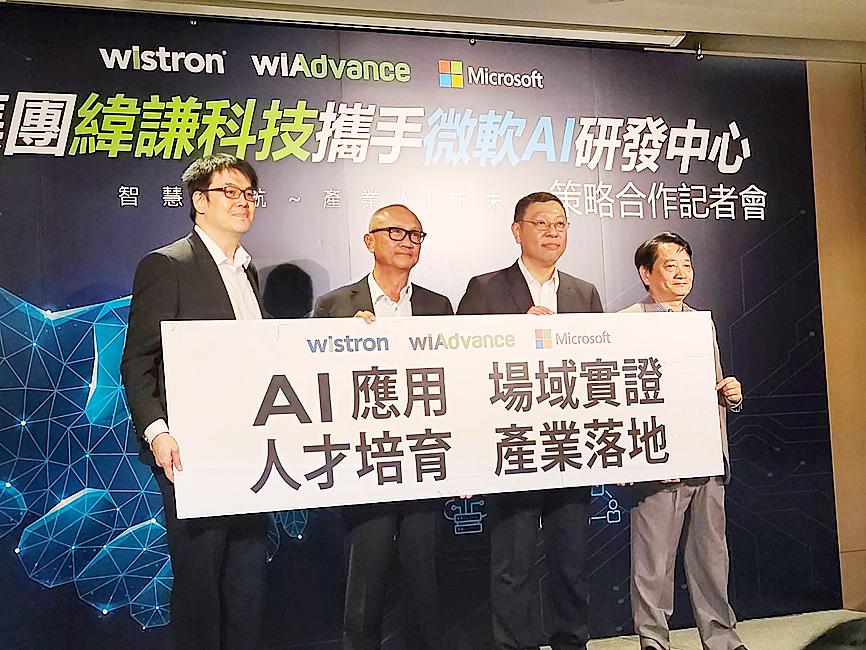Wistron Group (緯創集團) yesterday announced a strategic partnership with Microsoft Corp Taiwan’s artificial intelligence research and development center, whereby the two firms would create an office in Kaohsiung for artificial intelligence and big data-related products and services.
Wistron is also to invest NT$50 million (US$1.69 million) over the next two years to develop new talent in the area, Wistron Corp (緯創資通) vice chairman Robert Huang (黃柏漙) told a news conference in Taipei.
The office is part of the contract electronics manufacturer’s “digital transformation” from an original design manufacturer into a technology service provider, Huang said.

Photo: CNA
“Big data is not just for big business … it is the company’s mission to help all businesses embrace digital technology,” he said.
The Kaohsiung office is to have a strong emphasis on the cultivation of talent, as “we are growing people, not factories,” he added.
Artificial intelligence technologies are being developed for many different industries, and Wistron, in conjunction with Microsoft, plans to use its resources, as well its subsidiary WiAdvance Technology Co’s (緯謙科技) expertise in corporate digital transformation and smart manufacturing, to address various challenges facing local industries, Huang said.
Huang also serves as chairman of WiAdvance.
Tragedies such as the fire that killed six people at a karaoke parlor in Taipei in April could be avoided if inspectors could continually monitor firefighting equipment online, WiAdvance senior technology director Raymond Fan (范振煌) said.
Smart technology could also assist with disease prevention efforts by tracking individual’s movements and body temperature without compromising their privacy, he said.
As an example, Wistron has provided En Chu Kong Hospital (恩主公醫院) in New Taipei City’s Sanxia District (三峽) with a smart healthcare system incorporating remote capabilities.
The system allows medical instructions to be passed to patients and doctors to inspect how wounds are healing remotely, the company said.

Anna Bhobho, a 31-year-old housewife from rural Zimbabwe, was once a silent observer in her home, excluded from financial and family decisionmaking in the deeply patriarchal society. Today, she is a driver of change in her village, thanks to an electric tricycle she owns. In many parts of rural sub-Saharan Africa, women have long been excluded from mainstream economic activities such as operating public transportation. However, three-wheelers powered by green energy are reversing that trend, offering financial opportunities and a newfound sense of importance. “My husband now looks up to me to take care of a large chunk of expenses,

SECTOR LEADER: TSMC can increase capacity by as much as 20 percent or more in the advanced node part of the foundry market by 2030, an analyst said Taiwan Semiconductor Manufacturing Co (TSMC, 台積電) is expected to lead its peers in the advanced 2-nanometer process technology, despite competition from Samsung Electronics Co and Intel Corp, TrendForce Corp analyst Joanne Chiao (喬安) said. TSMC’s sophisticated products and its large production scale are expected to allow the company to continue dominating the global 2-nanometer process market this year, Chiao said. The world’s largest contract chipmaker is scheduled to begin mass production of chips made on the 2-nanometer process in its Hsinchu fab in the second half of this year. It would also hold a ceremony on Monday next week to

TECH CLUSTER: The US company’s new office is in the Shalun Smart Green Energy Science City, a new AI industry base and cybersecurity hub in southern Taiwan US chip designer Advanced Micro Devices Inc (AMD) yesterday launched an office in Tainan’s Gueiren District (歸仁), marking a significant milestone in the development of southern Taiwan’s artificial intelligence (AI) industry, the Tainan City Government said in a statement. AMD Taiwan general manager Vincent Chern (陳民皓) presided over the opening ceremony for the company’s new office at the Shalun Smart Green Energy Science City (沙崙智慧綠能科學城), a new AI industry base and cybersecurity hub in southern Taiwan. Facilities in the new office include an information processing center, and a research and development (R&D) center, the Tainan Economic Development Bureau said. The Ministry

State-run CPC Corp, Taiwan (CPC, 台灣中油) yesterday signed a letter of intent with Alaska Gasline Development Corp (AGDC), expressing an interest to buy liquefied natural gas (LNG) and invest in the latter’s Alaska LNG project, the Ministry of Economic Affairs said in a statement. Under the agreement, CPC is to participate in the project’s upstream gas investment to secure stable energy resources for Taiwan, the ministry said. The Alaska LNG project is jointly promoted by AGDC and major developer Glenfarne Group LLC, as Alaska plans to export up to 20 million tonnes of LNG annually from 2031. It involves constructing an 1,290km